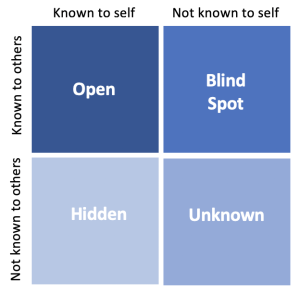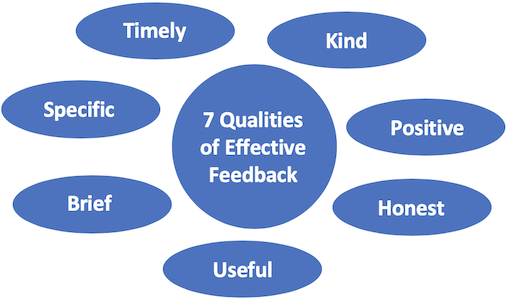15.1 Giving & Receiving Feedback
Why is Effective Feedback Important?
Effective feedback helps us improve and grow. Good feedback describes areas for improvement and offers ways to improve. Being able to give clear, useful feedback is an employability skill. Colleagues and bosses will appreciate your kind, helpful approach to improving teams and processes.
Effective feedback often tells us things we don’t know about ourselves. Sometimes it’s physical – like speaking too fast. Or it could be a mistake in our work that we’re not aware of. Effective feedback helps us see our Blind Spots. When we see them we can start to improve.
Johari Window

The Johari Window explains self-awareness as a quadrant:
- Open: What we know about ourselves, and is also known by others
- Blindspot: What we don’t know about ourselves, but is known by others
- Hidden: What we know about ourselves, but is not known by others.
- Unknown: What we don’t know about ourselves, and is not known by others (Luft & Ingham, 1961).
How to Give Feedback
Make sure anything you say is effective. Effective feedback has 7 qualities:
- Timely: Give feedback as soon as possible after the occurrence
- Kind: Help the recipient grow and build skills; don’t embarrass or shame them
- Positive: Tell the recipient what to do, not what not to do
- Honest: Always tell the truth (kindly!), even when a lie would feel more comfortable
- Useful: Make suggestions that are practical and actionable
- Brief: Focus on only 1 improvement – the most important one. (More may confuse the recipient)
- Specific: Be precise and give examples
–

The Easy 3-Step Method
There are many ways to give feedback. This simple 3-step method is easy to remember and use.
- Keep: Start by describing the best part: What’s good; what (specifically) did the person do well – what should they keep doing?
- Improve: Describe the most important improvement, and why it’s important. Focus on ‘next time’ or ‘in future.’ For example, Next time, try to let us know before the deadline. That way we can help you before it’s a problem. Or Next time, try to speak louder, so everyone can hear your great ideas.
- Ask: the recipient if they have questions, if what you said makes sense.
How to Receive Feedback
We often feel uncomfortable and/or embarrassed when receiving feedback. Most of us have a really mean inner critic who scolds us for not being perfect. This makes it hard to listen and learn.
When someone offers feedback, try to silence your inner critic so that you can benefit from the ideas and support. These strategies will help:
Listen actively
- Make eye contact with the person giving you feedback
- Take notes – you’ll forget what they said
- Summarize what they said
Be respectful & professional
- Avoid arguing, defending or explaining; try to drop your defences
- Watch your tone, words and body language
- Look for what’s true and what’s useful
Ask questions to clarify doubts and get precise details and examples
For example:
- Can you say more about…?
- Can you explain that further, please?
- What advice can you give me?
- How can I build that skill?
- Where could I learn more about…?
- What do you recommend?
Appreciate the feedback
- See the speaker’s good intentions
- Thank the speaker and show appreciation for their time and energy
- Look for what’s useful in the feedback and how it can help you
Reflect & grow
- Reflect on the feedback and decide your next steps:
- What did you learn?
- How will you use the feedback to improve your skills?
- What will you do next time?
“Giving & Receiving Feedback” from Professional Business Practice by Lucinda Atwood is licensed under a Creative Commons Attribution-NonCommercial 4.0 International License, except where otherwise noted.



